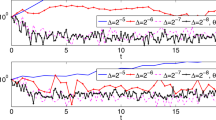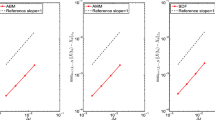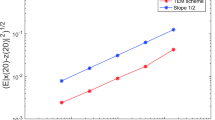Abstract
This research analyzes split-step composite \(\theta \)-Milstein (SSCTM) method based on stochastic delay differential equations, with particular focuses on examining its convergence and stability. We prove SSCTM method converges with strong order 1. Sufficient conditions for stability are given. Further, the regions in which SSCTM method exhibits stability are investigated. Numerical simulations validate our theoretical part.









Similar content being viewed by others
Data availability
No data was used for the research described in the article.
References
Mao X, Yuan C, Zou J (2005) Stochastic differential delay equations of population dynamics. J Math Anal Appl 304:296–320
Dung NT (2013) Fractional stochastic differential equations with applications to finance. J Math Anal Appl 397:334–348
Tian T, Burrage K, Burrage P et al (2007) Stochastic delay differential equations for genetic regulatory networks. J Comput Appl Math 205(2):696–707
Beretta E, Kolmanovskii V, Shaikhet L (1998) Stability of epidemic model with time delays influenced by stochastic perturbations. Math Comput Simlat 45(3–4):269–277
Shi J (2015) Optimal control for stochastic differential delay equations with Poisson jumps and applications. Random Oper Stoch Equ 23(1):39–52
Mao X (2007) Exponential stability of equidistant Euler-maruyama approximations of stochastic differential delay equations. J Comput Appl Math 200:297–316
Küchler U, Platen E (2000) Strong discrete time approximation of stochastic differential equations with time delay. Math Comput Simulat 54:189–205
Baker CTH, Buckwar E (2000) Numerical analysis of explicit one-step methods for stochastic delay differential equations. LMS J Comput Math 3:315–335
Baker CTH, Buckwar E (2005) Exponential stability in p-th mean of solutions and of convergent Euler-type solutions of stochastic delay differential equations. J Comput Appl Math 184:404–427
Zong X, Wu F, Huang C (2015) Theta schemes for SDDEs with non-globally Lipschitz continuous coefficients. J Comput Appl 278:58–277
Hu Y, Mohammed SA, Yan F (2004) Discrete-time approximations of stochastic delay equations: the Milstein scheme. Ann Probab 32:265–314
Mattingly JC, Stuart AM, Higham DJ (2002) Ergodicity for SDEs and approximations: locally Lipschitz vector fields and degenerate noise. Stoch Process Appl 101(2):185–232
Higham DJ, Mao X, Stuart AM (2002) Strong convergence of Euler-type methods for nonlinear stochastic differential equations. SIAM J Numer Anal 40(3):1041–1063
Zhang H, Gan S, Hu L (2008) The split-step backward Euler method for linear stochastic delay differential equations. J Comput Appl Math 225(2):558–568
Guo Q, Xie W, Tao X et al (2012) Convergence of split-step Milstein method for linear stochastic delay differential equations. Commun Appl Math Comput 26(04):456–464
Ding X, Ma Q, Zhang L (2010) Convergence and stability of the split-step \(\theta \)-method for stochastic differential equations. Comput Math Appl 60(5):1310–1321
Cao W, Hao P, Zhang Z (2014) Split-step \(\theta \)-method for stochastic delay differential equations. Appl Numer Math 76:19–33
Rouz OF, Ahmadian D, Milev M (2017) Exponential mean-square stability of two classes of theta Milstein methods for stochastic delay differential equations. AIP Conf Proc 1910:60015–60015
Guo Q, Li H, Zhu Y (2014) The improved split-step \(\theta \) methods for stochastic differential equation. Math Method Appl 37(15):2245–2256
Zhang Z, Zhang E, Li L (2022) The improved stability analysis of numerical method for stochastic delay differential equations. Mathematics 10(18):3366
Zhou L, Zhang J, Wang H (2007) Convergence of the composite \(\theta \)-method for a linear stochastic differential delay equation. J HLJU 06:778–783
Buckwar E (2000) Introduction to the numerical analysis of stochastic delay differential equations. J Comput Appl Math 125:297–307
Reshniak V, Khaliq AQM, Voss DA (2015) Split-step Milstein methods for multi-channel stiff stochastic differential systems. Appl Numer Math 89:1–23
Singh S (2012) Split-step forward Milstein method for stochastic differential equation. Int J Numer Anal Mod 9(4):970–981
Mao X (2007) Stochastic differential equations and applications. Elsevier
Liu M, Cao W, Fan Z (2004) Convergence and stability of the semi-implicit Euler method for a linear stochastic differential delay equation. J Comput Appl Math 170(2):255–268
Kloeden PE, Platen E (1992) Numerical solution of stochastic differential equations. Springer, Berlin
Funding
This work was supported by the [National Natural Science Foundation of China] under Grant [Numbers 61763008, 71762008, 62166015]; and the [Guangxi Science and Technology Planning Project] under Grant [Numbers 2018GXNSFAA294131, 2018GXNSFAA050005].
Author information
Authors and Affiliations
Contributions
YL contributed to conceptualization, methodology, software, formal analysis, writing—original draft, and writing—review and editing; HZ contributed to validation, writing—review and editing, supervision, project administration, and funding acquisition; SH contributed to investigation and visualization.
Corresponding author
Ethics declarations
Conflict of interest
The authors declare they have no financial interests.
Rights and permissions
Springer Nature or its licensor (e.g. a society or other partner) holds exclusive rights to this article under a publishing agreement with the author(s) or other rightsholder(s); author self-archiving of the accepted manuscript version of this article is solely governed by the terms of such publishing agreement and applicable law.
About this article
Cite this article
Lu, Y., Zhang, H. & Hong, S. Convergence and stability of the split-step composite \(\theta \)-Milstein method for stochastic delay differential equations. Int. J. Dynam. Control 12, 1302–1313 (2024). https://doi.org/10.1007/s40435-023-01253-y
Received:
Revised:
Accepted:
Published:
Issue Date:
DOI: https://doi.org/10.1007/s40435-023-01253-y




